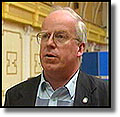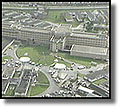GCHQ Union Ban Lifted
Staff at the Government's communications base GCHQ have been given the go-ahead to join trade unions for the first time in 13 years.
The Foreign Secretary Robin Cook announced the Government was lifting the ban on trade unions at the Cheltenham intelligence centre imposed by the Tory Government in 1984.
Mr Cook said the move was part of the Government's commitment to "open and fair relations" in the work place.
"As part of that commitment I want today to right a long-standing wrong. Since 1984, we have been pledged to restore normal trade union rights to the staff of GCHQ," he said.
"We are now honouring that pledge. I can announce that the conditions of service of staff at GCHQ have today been changed. They once again have the freedom they previously enjoyed to join any trade union they choose."
Mr Cook's announcement was attacked by the Conservative Party's chief whip, Alastair Goodlad. The decision, he said, had "potential implications for national security...Yet the Foreign Secretary will not make a statement to the House on the matter and subject himself to questioning as Geoffery Howe did at the time of the original decision."
Union delegates greeted the news with huge cheers at their annual conference as they paid tribute to some of the 14 workers who were sacked from GCHQ for refusing to give up union membership.

|
|
Former worker, Mike Grindley, welcomes move
|
Four of the sacked workers were paraded on stage at the Public Services, Tax and Commerce union conference in Blackpool.
They included Mike Grindley, who has led the campaign to win back union rights for the past 13 years.
He will not be returning to work as he is almost 60, but around half of the 14 sacked workers intend to resume their careers at GCHQ.
TUC general secretary John Monks said the lifting of the ban would be widely welcomed.

|
|
Monks: Ban was a slur on unions
|
"The ban has always been a blot on Britain's reputation for democracy and human rights. The previous government's belief that free trade unionism compromised national security was always an unjustified slur against the trade union movement and GCHQ staff in particular," he said.
"We have waited 13 long years for this dark stain on our democratic society to be removed," said Barry Reamsbottom, general secretary of the Civil and Public Services Association.
"I am absolutely delighted that we now have an honourable government in office which has wasted no time in righting this terrible wrong," he added.
The ban was imposed by the then Prime Minister, Margaret Thatcher, provoking uproar among staff.
Lady Thatcher claimed industrial action at the base, particularly during the 1981 civil service pay strike, had undermined the nation's security and justified the ban.
In exchange for relinquishing union membership, staff were each paid £1,000 to resign from their union.
|



